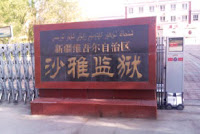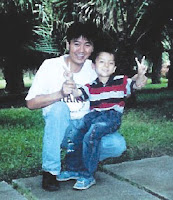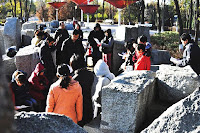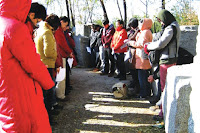 |
| A meeting at the Zhongfu Gangtou house church. |
China Aid has documented an escalation of government persecution over the past year that has spanned the country, from south China’s capitalist experiment in Shenzhen to the remote minority region of Xinjiang in far western China, from China’s largest and most sophisticated metropolis, Shanghai, to the farmlands of Henan province. From one end of China to the other, house churches are being targeted for police raids, eviction, and other acts of official persecution that have also included severe beatings of some house church Christians.
In Shenzhen in early September, a house church that had already been kicked out of previously rented premises was evicted again after only 20 days in its new location. The landlord said he had been pressured by the government, a well-known tactic that has been used most famously on Beijing’s Shouwang Church. The move against the Zhongfu Gangtou house church in Shenzhen followed similar persecution against three house churches in nearby Dongguang, Guangdong province.
In Xinjiang, clear at the other end of the country from Shenzhen, local police and government officials raided a house church meeting in Kuche and confiscated personal property including computers, cellphones, Bibles and Bible study materials. The church had already been the target of official harassment during its Sunday worship services, so the members had switched to gathering on Thursday afternoons when the latest raid occurred.
In Gushi county, Henan, dozens of police and government officials raided a house church’s Sunday worship service in late August, saying it was an illegal meeting and ordering the Christians to disband or risk being declared a cult and banned. Two days later, one of the Christians was forcibly taken to the police station where he was severely beaten for nearly two hours. Other church members said they have experienced an escalation in government attacks in the past six months.
In mid-September, a pastoral training session in Shanghai was forcibly ended by police and religious affairs officials, as was a similar gathering of nearly 100 people in Luoyang, Henan province.
China Aid strongly denounces the government’s illegal and barbaric actions in suppressing and persecuting house churches and Christians and calls on the Chinese government to take immediate and effective measures to stop the persecution of house churches and to safeguard the constitutional rights of Chinese citizens, including the right to freedom of religion.
Lawyers Unable to Meet with Gao, Alimujiang
In two discouraging developments, lawyers for both Christian lawyer Gao Zhisheng and Uyghur house church leader Alimujiang Ymiti were recently denied access to their imprisoned clients. Both men are being held in China’s remote far western region of Xinjiang.
 |
| Shaya Prison, Xinjiang |
The Christian lawyer hired by the wife of Alimujiang, who is serving a 15-year sentence on trumped up charges of “illegally providing state secrets to a foreigner,” went in mid-August to the Xinjiang No. 3 prison in the capital of Urumqi where he is being held and applied for permission to visit his client. Hours later, prison authorities denied his request, saying that because Alimujiang’s case involved state secrets, his meeting with a lawyer would also involve state secrets. Alimujiang’s 15-year sentence was upheld on appeal by a higher court in February 2011.
About two weeks later, two Christian lawyers hired by the older brother of Gao Zhisheng had a similar experience when they traveled from inland China to Shaya, in a remote part of western Xinjiang. After making the arduous journey, the two lawyers—prominent Beijing human rights lawyers Li Xiongbing and Li Subin—were first told that they needed prior permission to see Gao, who has been at Shaya prison since last December and whose long disappearances into police custody since 2006 have attracted worldwide attention. After studying paperwork provided by the lawyers, the prison authorities said that Gao did not want to see them, that Gao himself was an experienced lawyer and did not need to be represented by other lawyers and that the document signed by Gao’s brother authorizing the two lawyers to represent Gao was invalid because such authorization had to be signed by the prisoner himself. The authorities refused the lawyers appeal for a brief, face-to-face meeting with Gao to confirm that he truly did not want to see them.
 |
| Alimujiang with his eldest son before his 2008 arrest. |
The next day, the two lawyers went to the Xinjiang Prison Administration Bureau in Urumqi where they filed a complaint about the prison’s actions. They were told that the prison administration’s answer was the same as the prison’s.
China Aid has been championing both cases for years and has provided funds for the two men’s legal defense, as well as providing financial support to their families and helping Gao’s family escape to the United States.
Shouwang’s Request for Administrative Review of Police Action Rejected,
Outdoor Meetings Continue
 Eighteen months ago, Shouwang Church grabbed international headlines when it refused to give in to Chinese government pressure and moved its Sunday worship services outdoors. Shouwang Church had been repeatedly kicked out of rental properties and, due to government harassment, was unable to take possession of property it had purchased. At the time of the first outdoor service in April 2011, the church told its members that the forced outdoor worship might continue until Christmas. Little did they think that they would be closing in on a second Christmas with no sign of an end to the stalemate.
Eighteen months ago, Shouwang Church grabbed international headlines when it refused to give in to Chinese government pressure and moved its Sunday worship services outdoors. Shouwang Church had been repeatedly kicked out of rental properties and, due to government harassment, was unable to take possession of property it had purchased. At the time of the first outdoor service in April 2011, the church told its members that the forced outdoor worship might continue until Christmas. Little did they think that they would be closing in on a second Christmas with no sign of an end to the stalemate.
In September, Shouwang’s head pastor, Jin Tianming, decided to use China’s own legal system to assert his and Shouwang’s rights. On Sept. 14, he filed a request with the Beijing municipal government for an administrative review of the actions taken by Beijing police against Shouwang Church and its members, including confining all the church leadership to their homes since April 2011, as well as detaining church members who showed up at the church’s designated outdoor worship site, evicting them from their homes, and forcing them to quit their jobs. Just two and a half weeks later, the Beijing government rejected Pastor Jin’s request because it “found no evidence in the application for administrative review that you submitted to show that the activity that you are requesting to be administratively reviewed had occurred.”
Pastor Jin submitted supplementary material and a statement pointing out that the actions cited in his application were public incidents that were well-known to the religious community and relevant government departments.
Meanwhile, Shouwang members have continued their outdoor worship, marking the 41st Sunday on Oct. 7, when at least 17 members were detained by police.
Download ChinaAid November 2012 Newsletter in PDF:

